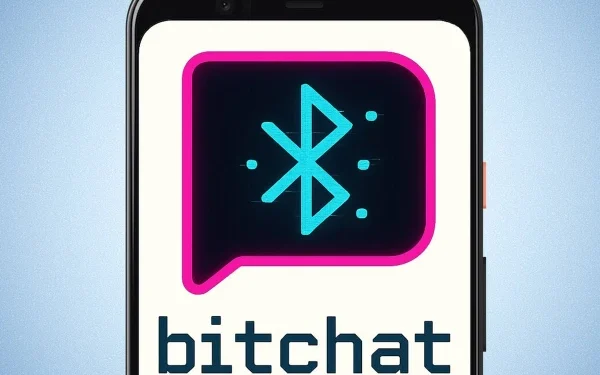SAN FRANCISCO – In a move that could revolutionize private messaging, Twitter co-founder Jack Dorsey has unveiled a new application called BitChat—a cutting-edge messaging platform that works without internet access. Positioned as a direct challenge to mainstream messaging apps like WhatsApp, BitChat promises complete decentralization, end-to-end encryption, and privacy without compromise.
The new app uses Bluetooth-based mesh networking to connect users without relying on mobile data, Wi-Fi, or traditional network infrastructures. This makes BitChat particularly useful during events such as music festivals, political protests, or natural disasters, where network connectivity may be poor or intentionally disrupted.
What Is BitChat? A New Era of Offline, Private Messaging
BitChat is a decentralized messaging application that does not require an internet connection to function. Instead, it utilizes a smartphone’s Bluetooth signal to send and receive messages within a defined physical range. In typical Bluetooth scenarios, that range is usually limited to 100 meters, but BitChat employs mesh networking technology to dramatically extend that distance.
“With mesh networking, each device acts as a node that forwards messages to other nearby devices,” explained BitChat’s white paper. “This allows the network to grow organically as more users come online in the vicinity.”
Through this method, the range can reportedly extend beyond 300 meters, depending on how many users are participating in the network at a given time.
Jack Dorsey’s Vision: Privacy Without Infrastructure
The launch of BitChat aligns with Jack Dorsey’s ongoing advocacy for decentralization and data privacy. Dorsey, who also founded Block Inc. (formerly Square) and helped develop Bluesky, has long criticized centralized internet platforms for collecting user data and enabling surveillance.
“BitChat doesn’t use email, phone numbers, or accounts. No central servers. No tracking. No data mining,” Dorsey wrote in a post on X (formerly Twitter). “Just pure peer-to-peer messaging.”
By completely eliminating the need for a centralized database, BitChat aims to be truly anonymous and censorship-resistant. Messages are encrypted locally, and users do not need to register with any identifiable information, significantly raising the bar for privacy in digital communications.
How BitChat Works: Bluetooth Mesh Network Explained
One of the core features that sets BitChat apart is its implementation of Bluetooth mesh networking—a protocol that enables devices to communicate with each other indirectly through a network of nodes. Here’s how it works:
- Local Connection: Your device connects to nearby users via Bluetooth.
- Message Relay: If the recipient is not within direct range, your message is passed from device to device until it reaches them.
- No Internet Needed: Since no centralized infrastructure is involved, BitChat can work even in complete network blackouts.
- High Privacy: Data is encrypted end-to-end, and no messages are stored in a centralized location.
This decentralized framework is particularly advantageous in regions with internet censorship, during emergencies, or in remote areas with limited cellular access.
Use Cases for BitChat: More Than Just a Messaging App
While BitChat is being marketed as an alternative to WhatsApp and other mainstream messaging apps, its offline capability and privacy-centric design make it highly suitable for a variety of real-world scenarios:
1. Protests and Civil Movements
In regions where governments impose internet blackouts to suppress protests, BitChat can provide a secure communication channel for activists and organizers. Messages can be relayed across the crowd, enabling coordination without risk of interception or shutdown.
2. Music Festivals and Large Events
Concertgoers often struggle with network congestion during large events. BitChat enables attendees to stay in touch without relying on Wi-Fi or cellular signals.
3. Natural Disasters and Emergencies
When earthquakes, floods, or other natural disasters damage communication infrastructure, BitChat can be used to organize rescue operations or notify family members.
4. Remote Areas with Poor Connectivity
For communities in rural or mountainous regions where network coverage is spotty or nonexistent, BitChat provides a lifeline for staying connected.
Technical Specifications and Security Features
BitChat’s white paper outlines a comprehensive set of features designed to ensure privacy, functionality, and resilience. Some key highlights include:
- Fully Decentralized Architecture – No central servers involved.
- End-to-End Encryption – Ensures that only the sender and recipient can read the message.
- No Personal Data Required – No email, phone number, or login needed.
- Ephemeral Messaging – Messages are not permanently stored on the device or in the cloud.
- Cross-Platform Compatibility – Initial release on Apple App Store (beta), with Android version expected soon.
By removing reliance on cloud storage and centralized databases, BitChat also minimizes the risk of data leaks or hacking incidents, which have plagued many traditional messaging platforms.
A Swipe at WhatsApp and Meta?
The launch of BitChat is being widely interpreted as a challenge to Meta-owned WhatsApp, which has faced criticism over data privacy concerns, especially after changes to its privacy policy in 2021. While WhatsApp uses end-to-end encryption, it still requires users to provide a phone number and stores metadata about user interactions.
In contrast, BitChat’s account-less, infrastructure-free model sets a new benchmark in digital privacy.
“BitChat isn’t just a tool—it’s a statement,” said one cybersecurity analyst. “It challenges the very notion that communication must pass through corporate servers or be monitored.”
Jack Dorsey has long been critical of Meta’s centralized approach to data handling, and BitChat appears to be a direct attempt to provide a truly private alternative.
Availability and Future Roadmap
As of now, BitChat is available in beta version on the Apple App Store, with further updates expected in the coming months. Developers have indicated that an Android version is also in the pipeline, along with plans for:
- Group chat support
- Encrypted file sharing
- Voice communication
- Open-source codebase for audit and contributions
The developers are also inviting feedback from early users to improve performance, fix bugs, and expand features.
Expert Reactions: Will BitChat Disrupt Messaging?
Industry experts have expressed cautious optimism about BitChat’s potential. While mesh networking is not a new concept, the combination of Jack Dorsey’s backing, modern encryption standards, and user-friendly design may give the app a significant boost.
However, some limitations remain:
- Bluetooth mesh networks are limited in scale unless many users are actively engaged in the same area.
- Battery consumption can increase when devices are constantly scanning for nearby connections.
- Offline-only functionality may restrict broader usability for users looking for internet-based messaging as well.
Nonetheless, privacy advocates and open-source enthusiasts have welcomed the app as a much-needed addition to the decentralized tech ecosystem.
Final Thoughts: A Step Toward Private, Decentralized Communication
With BitChat, Jack Dorsey continues to push the envelope on what decentralized technologies can achieve. In an era where digital privacy is increasingly under threat and centralized platforms dominate user data, BitChat offers a refreshing, user-first approach to communication.
While it remains to be seen how widely the app will be adopted, especially outside of niche use cases, BitChat’s launch is a significant moment for the future of offline messaging, mesh networking, and digital privacy.
As Dorsey himself posted:
“Communication shouldn’t depend on surveillance infrastructure. It should belong to us.”

























